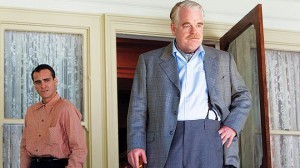In which I am forced to use the phrase ‘cult of personality’
By Angela Espinoza, Arts Editor
5/5

Few things in life are set in stone, and so we must learn not to take for granted what we’re lucky to have. There will always be a sunrise to wake up to, cats will always be adorable, and Paul Thomas Anderson will always make ridiculously awesome movies. Want something to put on at a party? You’ve got Boogie Nights (1997). Want something dark as fuck? There Will Be Blood (2007). Want something not insanely long? Punch-Drunk Love (2002). But now we’ve come to the point where we’ve received The Master, and honestly, I’m not sure where the hell this film would fit in.
The Master is, in all seriousness, a masterpiece; every shot, every musical cue, every breath Joaquin Phoenix drunkenly wheezes in your face or Philip Seymour Hoffman huffs down your neck is incredible. But unlike Anderson’s previous films, at no point can the viewer really figure out what they want. In Boogie Nights, you want to see if things work out for the best, and in There Will Be Blood, you want to know how horribly wrong it will all go, but with The Master, there’s no way of telling.
Part of what makes this distinction virtually impossible is that Anderson has provided us with neither a solid protagonist nor well-developed ensemble; we’re given two perfectly crafted leads, and we’re not sure what to do with them.
Phoenix portrays Freddie Quell, a drunken mess of a war veteran who one would most definitely consider “touched in the head,” while Hoffman portrays Lancaster Dodd a.k.a. The Master, the charismatic leader of a new religious movement known as The Cause. Taking place throughout the 1950s, we follow our two leads from when they first meet, and watch in awkward silence as it becomes clear the two are obsessed with each other; not inseparable, just obsessed.
Quell and Dodd have a number of other stomach-clenching interests, with Quell being a raging sexual deviant and Dodd of course having his cult-of-sorts to keep making tweaks and adjustments to. At the heart of it all though, there’s an unspeakable and instant bond between the two, and an unhealthy one at that. Whether Dodd’s instant attraction to Quell is honest or just another attempt at manipulation is something the viewer is left to think over for themselves—and they’ll be thinking about it a lot.
The overall feel of this film, from the first few minutes onward—and I hate using such a simple word to describe it—is absolutely creepy. Anderson’s previous film There Will Be Blood was extremely dark and heavy in content, which is what helps make The Master the perfect follow-up. Despite all the awful, miserable things Daniel Plainview (Daniel Day-Lewis) did to the people around him though, not once did it come across as, again, creepy. But when one takes the time to sit down and analyze Quell and Dodd, they can’t come to any other conclusion but the fact that both are simply, irreversibly creepy. There’s almost nothing sympathetic about our lead characters, largely because we only learn so much about their pasts, and yet, deep down, we grudgingly know whom we would like to root for.
[quote]There’s almost nothing sympathetic about our lead characters, largely because we only learn so much about their pasts, and yet, deep down, we grudgingly know whom we would like to root for.[/quote]
With Dodd and The Cause being what they are—adaptations of Scientology and its founder L. Ron Hubbard—obviously you want to go in hating him. But turns out he’s a loving family man, and he really does seem like maybe he wants to help cure Quell of his addictions. Then we have Quell, who’s a disgusting drunk, unpleasant to look at and uncomfortable to listen to. But we learn his life hasn’t been an easy one by any means, and again, he was never all there to begin with. It’s really all up to the viewer and their interpretation of whom we should sympathize with the most.
The Master is incredible, and at this point, you don’t need me to tell you how fan-freaking-tastic Phoenix and Hoffman are in every single moment of the film. I’ll never be able to decide which of Anderson’s films is my absolute favourite, but I wouldn’t need to think twice about which one is his most powerful; The Master has left me so unsettled, so closed in on myself, that I don’t think I ever want to see it again—and that is a good thing, perhaps even the highest level a film can achieve. So what are you waiting for? Go see it!
